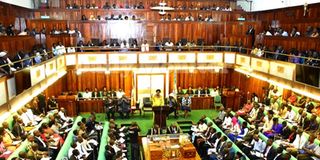How to enhance Parliament’s public relations

Speaker Rebecca Kadaga addresses plenary during the opening of a mock debate by members of the public on Friday, February 10, 2017.
What you need to know:
- Unless the above issues are addressed, having a people-centred Parliament will remain a distant rosy dream and the public will feel the more alienated by the House.
On February 7, I was part of Parliament Week’s panel discourse on laying strategies for engaging the public in activities of the House. During the discourse, members from the civil society organisations, the media and general public presented well thought out arguments on how to enhance citizens’ participation in the work of Parliament.
One outstanding proposition was the need to promote civic education so that the public is aware of the cardinal functions of Parliament. The Speaker, Rebecca Kadaga, seconded the need for civic education, stating that Parliament will soon commission its radio and television stations to relay information about business of the House to the public.
Whereas civic education is crucial, Parliament can do much more to cultivate public participation in its activities.
First, Parliament needs an overhaul in order to restore its credibility before the public. If we still have a Parliament where legislators largely prioritise issues concerning their welfare rather than the public good, then how do we expect to have a people-centred Parliament?
Secondly, the independence of Parliament seems to be under threat, especially from other arms of government like the Judiciary and Executive. Parliament has been reduced to an institution where numbers, rather than substance play a role in decision making. In fact, many Ugandans, basing on various media reports, regard Parliament as an extension of the ruling National Resistance Movement. It is, therefore, essential that the doctrine of separation of powers is urgently pursued for Parliament to emphasise its independence and restore public confidence.
Thirdly, the conduct of some of our legislators should be regulated since it tarnishes the image and integrity of Parliament. For example, why should MPs continuously absent themselves from the work they are paid to do and no punitive action is taken against them? Why should some MPs pride themselves in being legislators, solely for the sake of self-enrichment rather than for advancing interest of their constituents?
Unless the above issues are addressed, having a people-centred Parliament will remain a distant rosy dream and the public will feel the more alienated by the House.
Badru Walusansa,
Commonwealth correspondent




